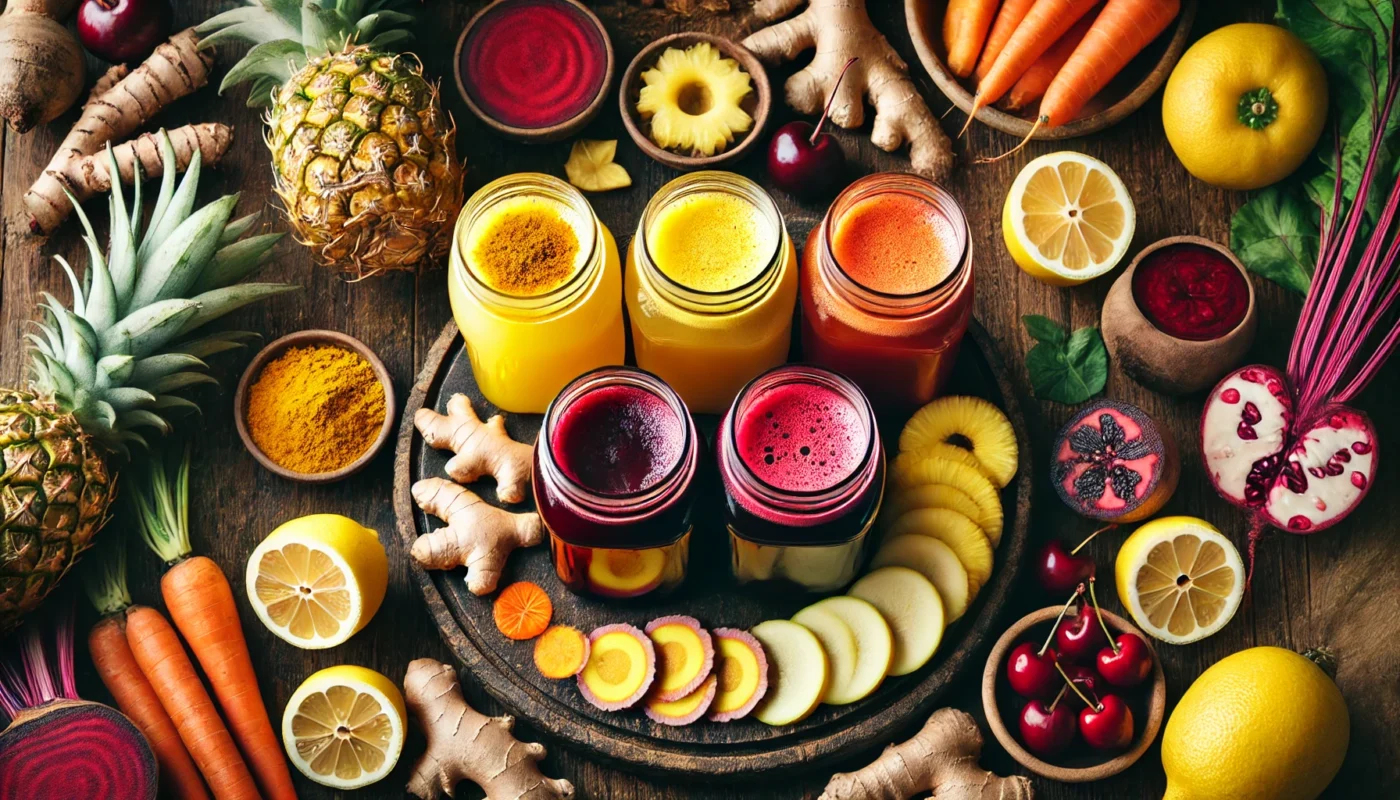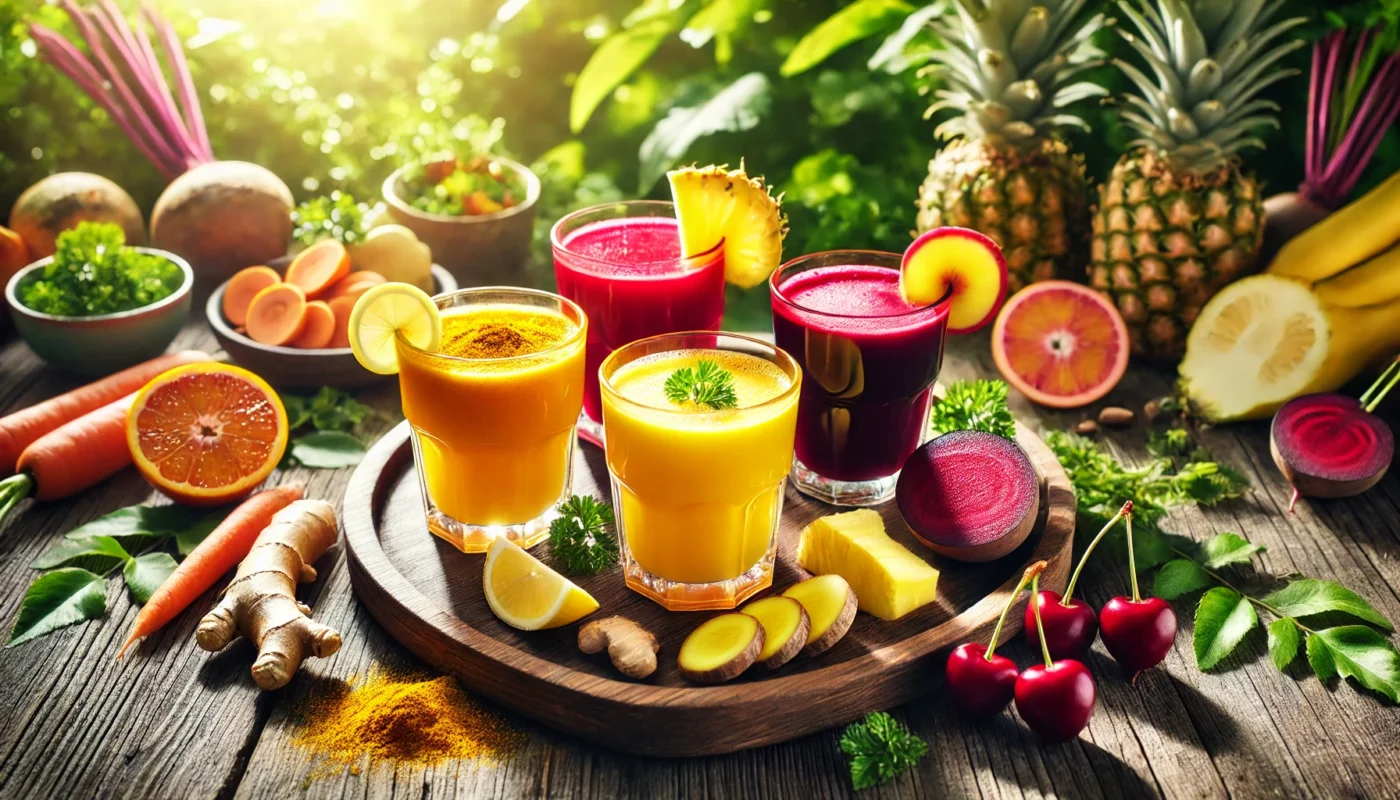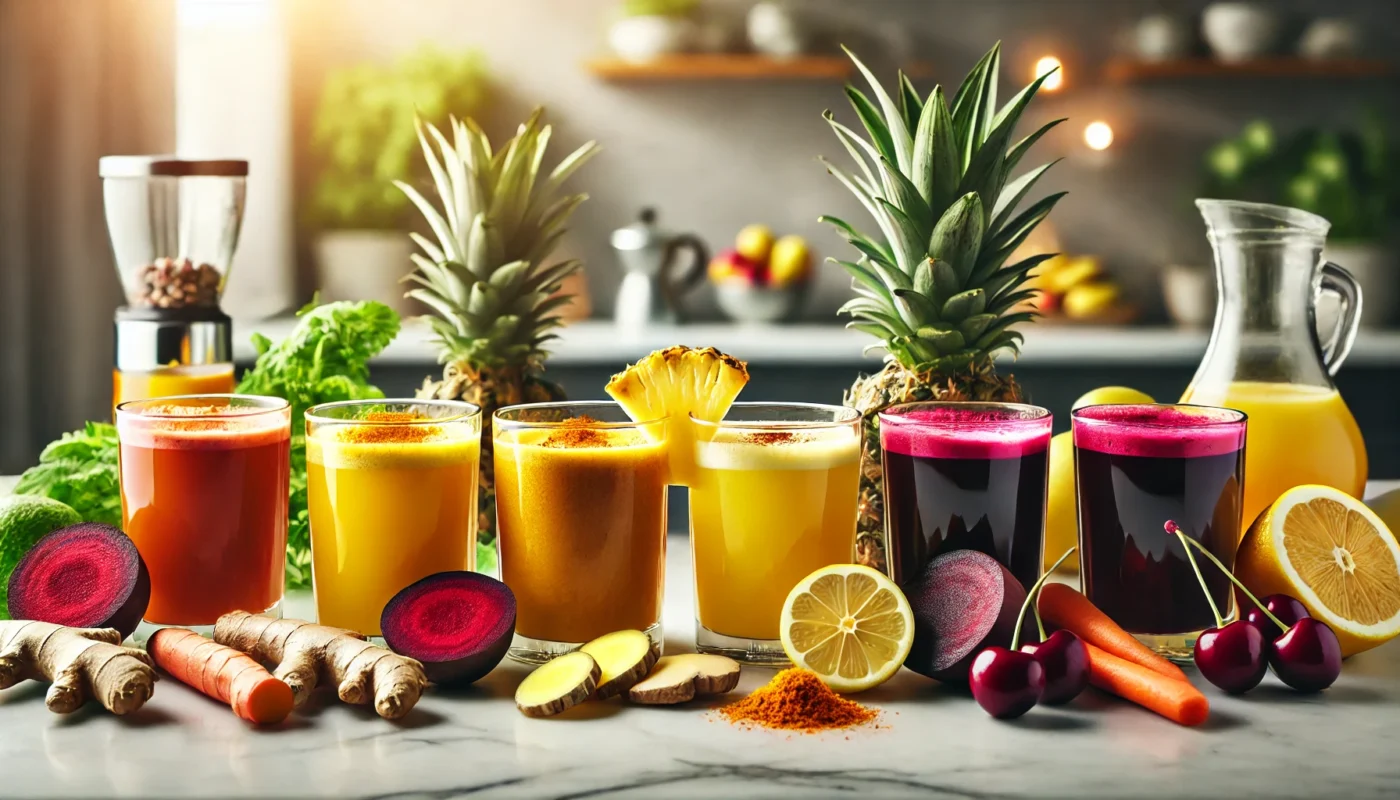Inflammation is a natural response of the body to injury or illness, but chronic inflammation can lead to a host of health issues, including arthritis, heart disease, and diabetes. While medications can help, many people are turning to natural remedies to reduce inflammation, and juices made from anti-inflammatory ingredients are increasingly popular. In this guide, we’ll explore some of the top juices that can help combat inflammation naturally, backed by scientific evidence and practical advice.
You may also like: 20 Powerful Anti-Inflammatory Foods
Understanding Inflammation and Its Impact
Inflammation is part of the body’s immune response, a vital process that helps heal wounds and fight infections. However, when inflammation becomes chronic, it can cause more harm than good. Chronic inflammation is linked to a variety of diseases and can cause symptoms like pain, fatigue, and swelling. Therefore, reducing inflammation is crucial for maintaining overall health.
Acute vs. Chronic Inflammation
Acute inflammation is a short-term process that occurs as a response to injury or infection. It is characterized by redness, heat, swelling, and pain. This type of inflammation is generally protective and resolves once the body has healed. In contrast, chronic inflammation is a prolonged inflammatory response that can last for months or even years. It often occurs when the immune system perceives a threat that isn’t actually there, leading to the destruction of healthy tissues and contributing to various diseases.
Diseases Linked to Chronic Inflammation
Chronic inflammation is a silent contributor to many diseases, often going unnoticed until significant damage is done. Some of the most common conditions associated with chronic inflammation include cardiovascular diseases, like heart attacks and strokes, autoimmune diseases, such as rheumatoid arthritis and lupus, and even some types of cancer. Understanding the link between chronic inflammation and these diseases is crucial for prevention and management.
Symptoms of Inflammation
Identifying the symptoms of inflammation can help in early intervention and management. Common signs include persistent pain, redness, swelling, and heat in affected areas. Fatigue and fever may also accompany these symptoms, indicating that the body is battling an underlying condition. Recognizing these signs can prompt individuals to seek medical advice and explore natural remedies like anti-inflammatory juices.
The Role of Diet in Inflammation
Diet plays a significant role in managing inflammation. Consuming foods and drinks rich in antioxidants and anti-inflammatory compounds can help reduce inflammation. Juices, in particular, are an excellent way to include a variety of these nutrients in your diet. They are easy to prepare, delicious, and can be tailored to meet specific health needs.
Anti-Inflammatory Foods
Incorporating anti-inflammatory foods into your diet can be a powerful strategy to combat chronic inflammation. Foods rich in omega-3 fatty acids, such as salmon and flaxseeds, are known for their inflammation-fighting properties. Similarly, fruits and vegetables like berries, leafy greens, and avocados are packed with antioxidants that protect the body from inflammatory damage.
The Power of Antioxidants
Antioxidants play a crucial role in combating inflammation by neutralizing free radicals, which are unstable molecules that can cause cellular damage. Vitamins C and E, flavonoids, and polyphenols are some of the potent antioxidants found in a variety of fruits and vegetables. Juices made from these ingredients can provide a concentrated dose of antioxidants, helping to reduce oxidative stress and inflammation.
Juices as a Nutrient Delivery System
Juices offer a convenient and tasty way to deliver a high concentration of nutrients directly to the body. By blending or juicing fresh fruits and vegetables, you can extract essential vitamins, minerals, and compounds that support the body’s anti-inflammatory processes. Additionally, juices can be easily customized to include a variety of ingredients, ensuring a wide range of nutrients in each glass.

Top Anti-Inflammatory Juices
Let’s delve into some of the best juices that can aid in reducing inflammation naturally.
Turmeric and Ginger Juice
Turmeric and ginger are renowned for their anti-inflammatory properties. Curcumin, the active ingredient in turmeric, is known to inhibit several molecules that play a role in inflammation. Similarly, gingerol, the main bioactive compound in ginger, has been shown to reduce inflammation effectively.
Health Benefits of Turmeric and Ginger
The combination of turmeric and ginger not only reduces inflammation but also offers numerous other health benefits. Turmeric is known to improve brain function and lower the risk of heart disease. Ginger aids in digestion, alleviates nausea, and boosts the immune system. Together, they create a powerful anti-inflammatory duo that can enhance overall well-being.
Recipe and Preparation Tips
To prepare a refreshing turmeric and ginger juice, start with fresh, high-quality ingredients. Use a tablespoon of fresh turmeric root or a teaspoon of ground turmeric, a tablespoon of fresh ginger root, the juice of one lemon, a tablespoon of honey, and two cups of water. Blend all the ingredients until smooth, strain for a clearer juice, and enjoy. For added flavor, consider adding a pinch of black pepper, which enhances the absorption of curcumin.
Variations and Serving Suggestions
For those who enjoy experimenting, consider adding other ingredients like carrots or apples to the turmeric and ginger juice for additional sweetness and nutrients. Serve the juice chilled or over ice for a refreshing drink. This juice can be consumed in the morning to kickstart your day with a burst of energy and anti-inflammatory benefits.
Pineapple and Lemon Juice
Pineapple contains bromelain, an enzyme with powerful anti-inflammatory effects. It is particularly beneficial for reducing swelling and pain in arthritis patients. Lemon adds a dose of vitamin C, further boosting the immune system.
The Role of Bromelain
Bromelain, found in pineapples, is an enzyme with remarkable anti-inflammatory and digestive benefits. It helps break down proteins, aiding digestion and reducing inflammation in the body. Bromelain is particularly effective in alleviating symptoms of sinusitis, osteoarthritis, and muscle soreness, making pineapple juice a fantastic choice for those seeking natural relief.
Recipe and Preparation Tips
Creating pineapple and lemon juice is simple and rewarding. Start with a cup of fresh pineapple chunks, the juice of one lemon, an optional tablespoon of honey for sweetness, and a cup of water. Blend the ingredients until smooth, strain to remove pulp, and serve chilled. For an added twist, include a few mint leaves for a refreshing flavor.
Enhancing the Flavor Profile
To elevate the taste of pineapple and lemon juice, consider incorporating other fruits like mango or orange for a tropical twist. A dash of cayenne pepper can add a spicy kick, enhancing the juice’s anti-inflammatory properties. Enjoy this juice as a mid-afternoon refreshment or a post-workout replenisher.

Beetroot and Carrot Juice
Beetroot and carrots are rich in antioxidants and beta-carotene, which help in reducing inflammation. Beetroot also contains nitrates, which improve blood flow and reduce blood pressure.
The Benefits of Nitrates and Beta-Carotene
Beetroot is a powerhouse of nitrates, compounds that convert into nitric oxide in the body, improving blood flow and lowering blood pressure. Carrots provide beta-carotene, an antioxidant that the body converts into vitamin A, essential for immune function and skin health. Together, they form a nutrient-dense juice that supports cardiovascular health and reduces inflammation.
Recipe and Preparation Tips
To make beetroot and carrot juice, use one medium beetroot, peeled and chopped, two carrots, peeled and chopped, one apple, cored and chopped, a one-inch piece of ginger, and a cup of water. Blend until smooth, strain for a refined texture, and savor this vibrant juice. For a sweeter flavor, add a dash of cinnamon or a squeeze of orange juice.
Creative Additions and Serving Ideas
Enhance the nutritional profile of beetroot and carrot juice by adding ingredients like spinach or kale for an extra dose of vitamins and minerals. Serve over ice or blend with ice for a frosty treat. This juice makes an excellent morning energizer or a pre-workout boost, thanks to its natural sugars and nutrients.
Cherry Juice
Tart cherry juice is one of the most researched anti-inflammatory juices. It contains anthocyanins, which are compounds that can reduce inflammation and pain. Studies have shown that cherry juice can be beneficial for athletes and those suffering from arthritis.
Anthocyanins and Their Anti-Inflammatory Effects
Anthocyanins, the compounds responsible for the deep red color of tart cherries, are powerful antioxidants with significant anti-inflammatory effects. They help reduce muscle damage and soreness, making cherry juice a popular choice among athletes. Additionally, these compounds may improve sleep quality and reduce the symptoms of gout and arthritis.
Recipe and Preparation Tips
To prepare cherry juice, use one cup of pitted tart cherries, one apple, cored and chopped, an optional tablespoon of honey for sweetness, and a cup of water. Blend the ingredients until smooth, strain for a smoother consistency, and enjoy. For added flavor, mix in a splash of vanilla extract or a pinch of nutmeg.
Pairing and Serving Suggestions
Cherry juice pairs well with other berry juices, such as blueberry or raspberry, for a delightful berry blend. Serve chilled or as a base for smoothies and cocktails. This juice is perfect for an evening wind-down, promoting relaxation and recovery after a long day or intense workout.
How to Incorporate Anti-Inflammatory Juices Into Your Diet
Integrating these juices into your daily routine is simple. Start by replacing one of your daily beverages with an anti-inflammatory juice. You can also rotate different juices throughout the week to enjoy a variety of nutrients and flavors. For optimal benefits, pair these juices with a balanced diet rich in whole foods, lean proteins, and healthy fats.
Building a Routine
Establishing a routine for consuming anti-inflammatory juices can enhance their effectiveness. Consider starting your day with a juice to boost your energy levels and metabolism. Alternatively, enjoy a juice as an afternoon pick-me-up or a post-workout recovery drink. Consistency is key, so find a time that works best for you and stick to it.
Combining Juices with Meals
Incorporating juices into your meals can enhance both their flavor and nutritional value. Pair a refreshing juice with breakfast to complement whole grains and proteins, or enjoy a glass alongside a light lunch or dinner. Juices can also serve as a healthy snack alternative, providing a quick dose of nutrients between meals.
Monitoring and Adjusting Intake
It’s essential to pay attention to how your body responds to different juices. Keep a journal to track any changes in your symptoms or overall health, and adjust your intake accordingly. If you notice any adverse effects, consult a healthcare professional to determine the best course of action. Remember, moderation is key, and juices should be part of a balanced diet.

Conclusion
Incorporating anti-inflammatory juices into your diet can be a delicious and effective strategy for combating inflammation naturally. With ingredients like turmeric, ginger, pineapple, and cherries, you can create a variety of tasty juices that not only help reduce inflammation but also support overall health. Remember, while juices can be beneficial, they should be part of a holistic approach to health that includes a balanced diet and regular exercise. As always, consult with a healthcare provider before making significant changes to your diet, especially if you have underlying health conditions. Enjoy your journey to better health with these powerful, natural juices.
Further Reading:
6 Best Anti-Inflammatory Drinks You Should Be Buying, According to a Dietitian
beetroot juice, carrot juice, cherry juice, anti-inflammatory, nutrition, health benefits, antioxidants, recipes, wellness, smoothies, healthy drinks, meal pairing, dietary tips, inflammation reduction, vitamins, minerals
Important Note: The information contained in this article is for general informational purposes only, and should not be construed as health or medical advice, nor is it intended to diagnose, prevent, treat, or cure any disease or health condition. Before embarking on any diet, fitness regimen, or program of nutritional supplementation, it is advisable to consult your healthcare professional in order to determine its safety and probable efficacy in terms of your individual state of health.
Regarding Nutritional Supplements Or Other Non-Prescription Health Products: If any nutritional supplements or other non-prescription health products are mentioned in the foregoing article, any claims or statements made about them have not been evaluated by the U.S. Food and Drug Administration, and such nutritional supplements or other health products are not intended to diagnose, treat, cure, or prevent any disease

